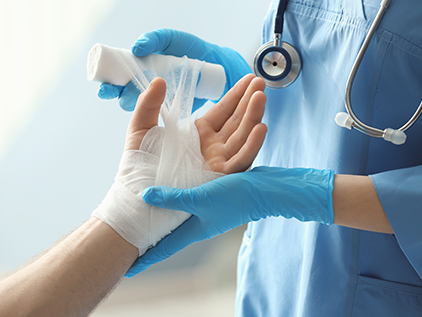Warm weather and summer are eagerly welcomed with barbecues, parades, festivals, vacations and fireworks. One thing often overlooked, however, is fireworks safety.
According to the U.S. Consumer Product Safety Commission (CPSC), there were approximately 9,700 fireworks-related injuries in 2023, and approximately 190 injuries per day occur around July 4. The highest rates of injuries are among teens and children. Many of these are eye injuries. From contusions to corneal lacerations, everyone is at risk of a fireworks-related eye injury, even if proper safety precautions are taken. Even seemingly safe fireworks such as sparklers can cause serious burns, particularly among children.
Using common sense, such as never pointing or aiming any fireworks at another person and maintaining a safe distance when viewing fireworks, is key to having an injury-free holiday, says ophthalmologist Mary Champion, MD, of The University of Kansas Health System's eye center.
Following these simple rules can help keep everyone safe from harm:
- Children should never be allowed to handle fireworks.
- When lighting or handling fireworks, put on safety glasses to protect the eyes.
- Only use fireworks outside in an open area.
- Keep a bucket of water nearby at all times to soak fireworks duds, and do not try to relight them.
- Don’t light fireworks in any type of container, and never carry them in a pocket, because the friction of movement can cause them to light.
- Keep a first aid kit handy, and if serious injury is suffered, seek medical attention.
If an eye injury from fireworks occurs, remember:
- Seek medical attention immediately.
- Do not rub your eyes.
- Do not rinse your eyes.
- Do not apply pressure.
- Do not remove any objects that are stuck in the eye.
- Do not apply ointments or take any blood-thinning pain medications such as aspirin or ibuprofen.
- Do not apply ice to a burn.
Alternatives to fireworks

Superior burn care
The Gene and Barbara Burnett Burn Center is the only adult and pediatric burn center in the region accredited by the American Burn Association and the American College of Surgeons. We treat patients with chemical, electrical, flame or scald burns or with complex wounds and skin conditions.




